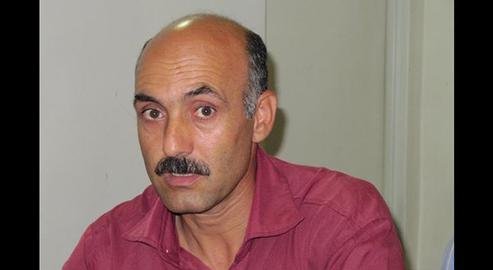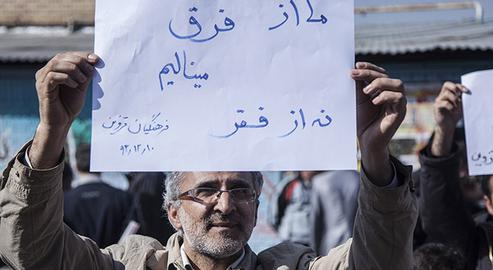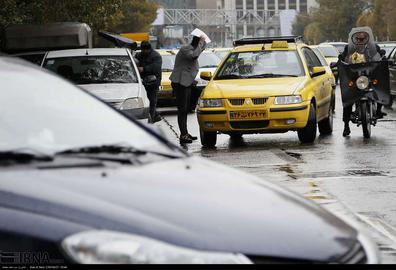More than a dozen teachers remain behind bars since the October crackdown on protests across the country — and most have them have been denied visits from their families.
On October 14, Iranian teachers went on a nationwide, two day sit-in strike in 50 cities. Their demands included better pay, improved benefits, safety at work and greater equality. During and after the strike, around 100 teacher activists were summoned or arrested, or faced harassment via text messages.
Rasoul Bodaghi, a well-known member of the Teachers’ Association of Iran, served a seven-year prison sentence for his union activities, and did not even have a one-day leave of absence. He has expressed worry about the 13 teachers who remain under arrest and, according to him, have not even been allowed to call their families.
Bodaghi well remembers his difficult days in prison from 2009 to 2016. “For a full seven months my mother was in a hospital bed,” he said, “and she had only one request: ‘Bring Rasoul so I can see him.’ For seven months she did not know that her son was in prison.”
But in addition to seven years in prison and being prevented from attending his mother’s funeral, Bodaghi endured even further punishment for his activities in support of teachers’ and student’s rights. After 22 years of teaching, he was expelled from the Ministry of Education and told he could no longer work for the ministry. “After I was released from prison I went to the Education Bureau of Eslam Shahr [a city in Tehran Province] to object against my expulsion,” he said. “’To be quite honest, there is nothing that I can do,’ the bureau head said. ‘The only thing we can do is to send it [the official expulsion notice] to the ministry in Tehran [through official channels] but that will take a long time. So the best thing is for you to take the letter to the Education Ministry yourself.”
Have you Learned your Lesson?
So he took the letter informing him of his expulsion to the Education Ministry himself. However, all that the Director General of the ministry’s Department of Discipline told him was: “Have you learned your lesson to get your job back?”
Afterwards, Bodaghi went to the National Bureau of Employment Affairs more than once to resolve the problem. But to this day he has been denied his salary and benefits. Nevertheless, contrary to the wishes of the Education Ministry’s authorities, he has not yet “learned his lesson” —he continues to fight for the rights of students and teachers.
Bodaghi told IranWire that what the Teachers’ Association primarily objects to is that education has been “commodified,” “I can say categorically that our education system has been totally monetized,” he said. “School officials, both in private and in public schools, demand money from the students even for their exam papers. The students have become a source of revenue for the government’s budget. The profit from selling buffet meals to the students is directly deposited into the government’s account instead of spending it on educational institutions. School officials take money from the students for extracurricular programs but then do not hold the classes.”
What Rasoul Bodaghi calls “commodification” of education started under Akbar Hashemi Rafsanjani’s presidency (1989-1997) and with Mohammad Ali Najafi, his Minister of Education. It was at that time when the so-called “non-profit” schools were created to, supposedly, help build the budget for the expansion of public schools but, according to Bodaghi, not only did this not happen but it turned into a model for “extortion.”
“If we just look at this policy of creating non-profit schools, we discover the truth about the larceny in education,” he said. “These schools are called ‘non-profit’ but they charge people a huge amount of money. This has gradually led to the monetization of the public school. In fact, my guess is that at the start of each year the government sets a budget for education but does not spend it all on education. Where they spend it I do not know. Then, to run the schools, they compensate the shortfall by charging the parents of the students.”
Under these conditions, according to Bodaghi, the schools cannot even afford to buy footballs for physical education classes. “Art classes have practically disappeared,” he said, “and, in overcrowded classrooms, the teachers have no chance to work one-to-one with the students.” He argues that the schools need libraries, electronic whiteboards, foreign language labs, computer labs and other modern teaching tools. “Currently,” he pointed out, “in technical and vocational schools there is only one computer for three students studying computer science.”
Picking Parents’ Pockets
All of this has prompted Rasoul Bodaghi to label the Iranian education system “a legal swindle racket.” “This is a system that picks people’s pockets with the support of the law,” he said, “and when we protest against it they put us in prison.”
Another of the teachers’ demands is that their salaries be adjusted to keep pace with inflation. They have called for the implementation of a “law for a unified system for the salaries of government employees,” and the demand has regularly been voiced during protest rallies.
“One of our most important demands is to increase the budget for the Ministry of Education to adjust the salaries of the teachers — both those who are retired and those who are still on the job — for inflation,” Bodaghi told IranWire. “And the insurance situation for teachers is not good at all. Just a few days ago a teacher decided not to have medical tests because it would cost 400,000 tomans [$96]. Some teachers receive a salary of only 1.6 million tomans [$380]. How can they effectively provide for their families in this crisis?”
Bodaghi says that not only have teachers’ financial demands not been met, but they have faced harsh treatment for making these demands in the first place, and the security establishment has done everything it can to bludgeon teachers into silence. “It is so bad that even when retired teachers take part in union activities they are threatened [and told] that their children will be barred from working for the government if they continue their activities,” he said. “Many retirees have been forced into silence because of this fear.”
Related Coverage:
, November 19, 2018
Iranian Teachers on Nationwide Strike, October 15, 2018
, December 12, 2016
1,000 Teachers Behind Bars in Iran, August 28, 2015
Teachers Under Attack as Key Activist Jailed, July 1, 2015
, May 5, 2015
Is Being a Teacher a Crime?, April 27, 2015
Teachers Rally in Khuzestan, April 18, 2015
Teachers Take to the Streets, March 2, 2015
visit the accountability section
In this section of Iran Wire, you can contact the officials and launch your campaign for various problems


























comments